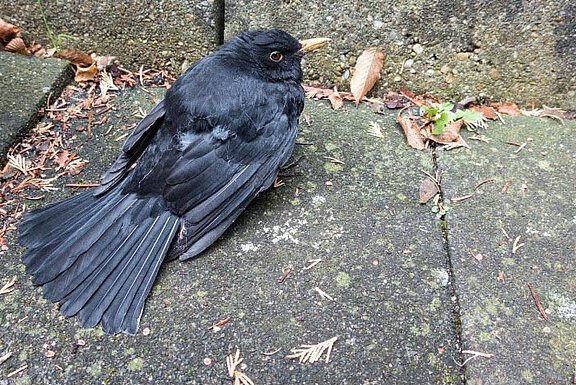Since August 2016, the National Reference Laboratory for West Nile virus at the Friedrich-Loeffler-Institut (FLI) has confirmed an increased detection of Usutu virus (USUV) in wild birds and zoo birds. Mainly blackbirds (Turdus merula) are affected, but also increased numbers of great grey owls (Strix nebulosa) from aviaries in different zoos and wildlife parks have died from USUV infection.
This is not the first time USUV has been detected in birds. In close cooperation with the State diagnostic agencies, the Bernhard-Nocht-Institute for Tropical Medicine (BNITM) and the Action group for mosquito control (KABS) the virus was detected from 2011-2015 in wild birds and birds kept in aviaries in Southwest Germany. The main epidemic area was located in the Upper Rhine Valley and the neighboring regions of the Palatinate and the Neckar Valley, single cases were also found in the area of Cologne (North Rhine-Westphalia). In 2015, two positive cases were first detected in the Northeast of Germany, in two great grey owls (young animals) kept in an aviary in Berlin.
This year, USUV shows a very strong activity and is widely distributed. Mainly the border triangle Germany-Netherlands-Belgium is affected, in North Rhine-Westphalia increased numbers are mainly found in the Lower Rhine area and the region around Aachen. Increased numbers of USUV-infected birds have also been found in the area around Leipzig. In addition to single USUV-positive birds in the known epidemic area in Southwest Germany along the Rhine from Freiburg to Cologne, further single cases have also been found in the area around Halle, Dresden, Berlin, and Saarbrücken.
Currently, extensive genetic investigations in cooperation with partners from Germany and other countries are ongoing to gain more information on the distribution of the different USUV strains in Germany.
To increase the number of data, the Federal Office for Agriculture and Food (BLE) supports the project „mosquito monitoring“ in Germany with emphasis on the early detection of mosquito-borne pathogens in Germany.
Usutu virus originates from Africa (named after a river in Swaziland) and is transmitted by mosquitoes. Main hosts are wild birds which, as a rule, do not develop clinical disease. But also highly susceptible bird species are known, e.g. blackbirds which contract the infection very easily. Clinically, these infected birds often show apathy and central nervous disorders such as staggering and twisting of the head. (see figure).
More information on the clinical picture, distribution, transmission, and control can be found in our information sheet on Usutu virus infections (in German language only).


